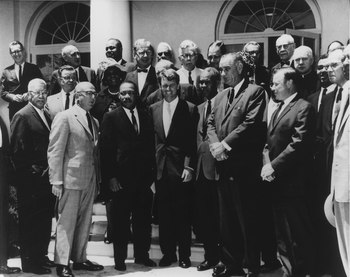
The FBI was under written directive from Attorney General Robert F. Kennedy when it began tapping King's telephone in the fall of 1963.
Kennedy was concerned that allegations of communists in the SCLC—if
they were made public—would derail the administration's civil rights
initiatives.
He warned King to discontinue these associations and later
felt compelled to issue the written directive that authorized the FBI to
wiretap King and other SCLC leaders.
FBI Director J. Edgar Hoover
feared the civil rights movement and investigated the allegations of
communist infiltration.
When no evidence emerged to support this, the
FBI used the incidental details caught on tape over the next five years
in attempts to force King out of his leadership position, in the COINTELPRO program.
King believed that organized, nonviolent protest against the system of southern segregation known as Jim Crow laws
would lead to extensive media coverage of the struggle for black
equality and voting rights.
Journalistic accounts and televised footage
of the daily deprivation and indignities suffered by Southern blacks,
and of segregationist violence and harassment of civil rights workers
and marchers, produced a wave of sympathetic public opinion that
convinced the majority of Americans that the civil rights movement was
the most important issue in American politics in the early 1960s.
King organized and led marches for blacks' right to vote, desegregation, labor rights, and other basic civil rights.
Most of these rights were successfully enacted into the law of the United States with the passage of the Civil Rights Act of 1964 and the 1965 Voting Rights Act.
No comments:
Post a Comment